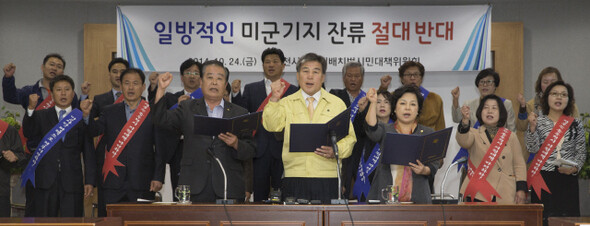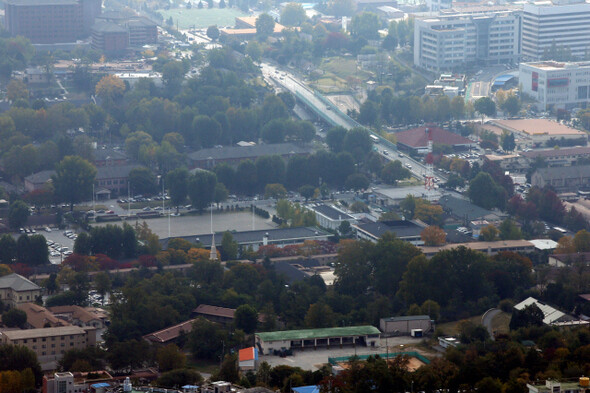hankyoreh
Links to other country sites 다른 나라 사이트 링크
Latest OPCON transfer delay is Pres. Park’s latest broken campaign promise

On Oct. 24, the Blue House responded to accusations that the US and South Korean agreement to delay once more the transfer of wartime operational control (OPCON) of the South Korean military is a violation of a campaign pledge made by President Park Geun-hye. “This is something that should be viewed rationally and realistically from the perspective of national security. It is not a violation of Park’s campaign pledge,” Blue House spokesperson Min Kyung-wook said.
“The government’s position that South Korea must exercise wartime operational control over its own military remains unchanged. But when we consider the security situation, and the increasing threat of North Korea’s nuclear weapons and missiles, we need to make more preparations for the OPCON transfer,” Min said during a briefing.
The Blue House had initially remained silent about the decision to delay the OPCON transfer and did not provide an explanation until accusations that Park had broken her campaign pledge to move forward with the OPCON transfer increased in intensity.
However, many aspects of the Blue House‘s explanation were ambiguous or contradictory, such as the claim that it had not broken the pledge even as it placed national security over carrying out the pledge, and that its position on the OPCON transfer was unchanged even though it was being delayed. As a result, the Blue House response is open to criticism as a hastily prepared excuse.
In November 2012, during her presidential election campaign, Park said at a press conference, “We have to prepare for the OPCON transfer without delay”. In February 2013, Park’s inauguration preparatory committee said they would move ahead with the transfer as planned.
During the morning briefing on Oct. 24, Min had responded to multiple questions about the delay of the OPCON transfer by saying that he had no prepared response. But when this fuelled controversy, the Blue House released a statement the same afternoon.
“We are definitely committed to the transfer of operational control of South Korean forces, and we will create an implementation system to back up our commitment by next year,” said Defense Minister Han Min-koo, in an attempt to assuage public opposition to the agreement. Han, who was in charge of the negotiations about delaying the OPCON transfer, made the remarks during a press conference held immediately after the 46th ROK-US Security Consultative Meeting that took place in Washington, D.C., on Oct. 23.
When a reporter pointed out that no timeframe had been specified for the OPCON transfer during the Security Consultative Meeting and asked whether the transfer wasn‘t effectively being postponed indefinitely, Han questioned the logic of this conclusion. “It is the Defense Ministry’s position that the conditions for the OPCON transfer will be satisfied by the mid-2020s. Our basic plan to carry out the OPCON transfer remains unchanged,” Han said.
The explanations made by the Blue House and the Defense Ministry on Friday were unilateral notices delivered to the public - after the agreement had already been made - that nothing could be done about delaying the OPCON transfer because of the security situation. This underscores once again the current administration’s problems with being uncommunicative. The abrupt decision to allow USFK to maintain bases at Yongsan and Dongdusan has thrown the urban planning of the affected areas into confusion, but the Blue House offered neither an apology nor an explanation about this.
The fact that the government did not inform the people or allow public debate of the national sovereignty that President Park promised during the election, despite negotiating the issue with the US for a year and a half, seems likely to continue provoking opposition in the future.

By Seok Jin-hwan, Blue House correspondent and Park Byong-su, senior staff writer
Please direct questions or comments to [english@hani.co.kr]

Editorial・opinion
![[Column] Park Geun-hye déjà vu in Yoon Suk-yeol [Column] Park Geun-hye déjà vu in Yoon Suk-yeol](https://flexible.img.hani.co.kr/flexible/normal/500/300/imgdb/original/2024/0424/651713945113788.jpg) [Column] Park Geun-hye déjà vu in Yoon Suk-yeol
[Column] Park Geun-hye déjà vu in Yoon Suk-yeol![[Editorial] New weight of N. Korea’s nuclear threats makes dialogue all the more urgent [Editorial] New weight of N. Korea’s nuclear threats makes dialogue all the more urgent](https://flexible.img.hani.co.kr/flexible/normal/500/300/imgdb/original/2024/0424/7317139454662664.jpg) [Editorial] New weight of N. Korea’s nuclear threats makes dialogue all the more urgent
[Editorial] New weight of N. Korea’s nuclear threats makes dialogue all the more urgent- [Guest essay] The real reason Korea’s new right wants to dub Rhee a founding father
- [Column] ‘Choson’: Is it time we start referring to N. Korea in its own terms?
- [Editorial] Japan’s rewriting of history with Korea has gone too far
- [Column] The president’s questionable capacity for dialogue
- [Column] Are chaebol firms just pizza pies for families to divvy up as they please?
- [Column] Has Korea, too, crossed the Rubicon on China?
- [Correspondent’s column] In Japan’s alliance with US, echoes of its past alliances with UK
- [Editorial] Does Yoon think the Korean public is wrong?
Most viewed articles
- 1[Guest essay] The real reason Korea’s new right wants to dub Rhee a founding father
- 2[Column] ‘Choson’: Is it time we start referring to N. Korea in its own terms?
- 3Why Korea shouldn’t welcome Japan’s newly beefed up defense cooperation with US
- 4New AI-based translation tools make their way into everyday life in Korea
- 5Senior doctors cut hours, prepare to resign as government refuses to scrap medical reform plan
- 6Opposition calls Yoon’s chief of staff appointment a ‘slap in the face’
- 7Terry Anderson, AP reporter who informed world of massacre in Gwangju, dies at 76
- 8[Editorial] Japan’s rewriting of history with Korea has gone too far
- 9[Column] Park Geun-hye déjà vu in Yoon Suk-yeol
- 10Will NewJeans end up collateral damage in internal feud at K-pop juggernaut Hybe?